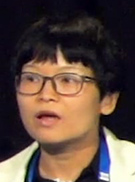Anti-tumor activity of compound CAR T cells targeting both CLL1 and CD33 in a variety of CLL1+ and CD33+ leukemia cells in vitro and in vivo
The efficacy of anti-CD19 CAR T cells is impressive in acute lymphoblastic leukemia and lymphoma. However, treatment of relapsed/refractory acute myeloid leukemia (AML) remains a substantial clinical challenge since AML bears heterogeneous cells that can offset killing by single CAR-based therapies, resulting in disease relapse. During EHA 2018, Liu et al. reported robust anti-tumor activity of compound CAR (cCAR) T cells possessing discrete scFv domains targeting 2 different AML antigens, CLL1 and CD33, simultaneously.
Leukemic stem cells (LSCs) associated with CLL1 expression comprise a rare population that plays an important role in AML progression and relapse. CD33 is a myeloid marker found on bulk AML cells in the majority of AML patients. Liu et al. generated a cCAR bearing 2 complete CAR constructs connected by a self-cleavable peptide linker, P2A. During EHA 2018, the first data with the CLL1-CD33 cCAR T cells were shown. It was demonstrated that these CLL1-CD33 cCAR T cells were able to ablate both the CLL1- or CD33-expressing REH cells independently both in co-culture assays and in mouse models. In addition, it was shown that CLL1-CD33 cCAR T cells promoted sustained in vivo anti-leukemic activity against the AML U937 cell line, as well as superior murine survival in both models. These findings indicate that targeting both CLL1 and CD33 on AML cells may be an effective strategy for eliminating both AML bulk disease and LSCs, potentially preventing relapse due to antigen escape or LSC persistence.
In the first-in-human phase I clinical trial, CLL1-CD33 cCAR T cell therapy was safe and well tolerated and the refractory AML patient (44 year old female) achieved complete response. The adverse events this woman had were cytokine release syndrome (grade 1) and pancytopenia.
In conclusion, this study supports the development of CLL1-CD33 cCAR T cells as a promising immunotherapy for AML. In the first-in-human clinical trial of CLL1-CD33 cCAR T cell therapy, the feasibility and safety of targeting both CLL1 and CD33 to achieve complete response was demonstrated. Liu et al. suggested further exploration of CLL1-CD33 cCAR T therapy as a stand-alone therapy or ‘bridge to transplant’ for patients with aggressive, relapsed/refractory AML.
Reference
Liu F, Pinz K, Ma Y, et al. First-in-human CLL1-CD33 compound car t cells as a two-pronged approach for the treatment of refractory acute myeloid leukemia. Presented during EHA 2018; Abstract S149.


